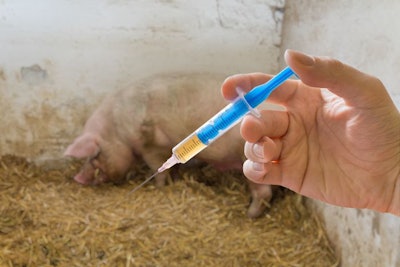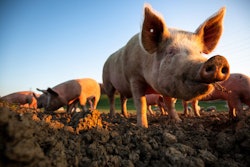
In the Philippines, the government has recently provided funds to develop a vaccine against African swine fever, as well as to support repopulation of previously disease-hit regions of the country.
In the Philippines, the government has offered a grant to a company to kick-start the development of a vaccine against African swine fever (ASF).
According to the Philippine News Agency (PNA), almost PHP16 million (US$310,000) will be given to BioAssets Corp. by the Department of Science and Technology. The veterinary research and diagnostics company said it will use the funding to support the development of an ASF vaccine.
If successful, this project could be the world’s first vaccine against a disease that has devastated pig production across Asia, Africa, Europe and the Caribbean since 2018.
A second new government initiative is a new mobile laboratory. Equipped with portable diagnostic devices, this will be available for use in remote areas where these services are currently unavailable.
Philippines: new outbreaks, recovery
In parts of the Philippines, the recovery continues after previous ASF outbreaks. First cases in the country occurred in July 2019.
In Central Luzon, a cooperation between the Department of Agriculture and a private firm has resulted in construction of a new pig breeding facility.
PNA reports that the department contributed PHP80 million for a new 5,000-sow nucleus farm in the province of Nueva Ecija. Partners in the project are JG Agroventures Inc. and the Pig Improvement Co. (PIC). When completed, the unit will supply high-quality pigs to commercial farms and backyard herd owners.
The pig population in the country is estimated at 9.4 million. Prior to the first outbreaks in July 2019, there were around 12 million hogs. In those regions where the disease has been eliminated, efforts are being made to re-populate.
Other recently announced initiatives with this aim have been made by Univet Nutrition and Animal Health Care Co. , and Charoen Pokphand Foods Philippines (CP Foods). With an investment of PHP500 million, CP Foods is developing a pig breeding facility in Isabela. Located in the northeastern Luzon region of Cagayan Valley, the unit expects to produce 600,000 finished pigs this year.
Elsewhere in the Philippines, PNA reports there have been new outbreaks of ASF. Since the start of the year, four towns in southern Mindanao have registered outbreaks, leading to the culling of pigs in the surrounding area. In several provinces in the Soccsksargen region, biosecurity measures have been stepped up, and more checkpoints set up on provincial borders.
Further outbreaks in Thailand
In the period January 24-31, 12 new outbreaks of ASF were officially registered in Thailand.
According to the latest notification to the World Organisation for Animal Health (OIE), all affected herds were in villages. In some cases, a single case was reported out of an unspecified number of affected animals. Where a herd size is given, the largest affected comprised 128 pigs.
The latest outbreaks occurred in 11 provinces across the country. These included seven where the cases were the first in the province. Four of the provinces share borders with Cambodia, Myanmar or Laos.
Since the first ASF cases in the country in November 2021, 31 outbreaks have been reported to the OIE. According to this source, 915 pigs have been directly impacted.
This week, a member of the Thai parliament alleged that ASF has been circulating in the country since 2019. Thai PBS World reported that the government was accused of covering up the spread of ASF for two years, and was deaths of 300,000 pigs.
Previously, pig farmers were reported to be angered by the apparent wide spread of the disease before the first cases were officially confirmed. Authorities in the country maintain that the earlier mortalities arose from other diseases, and not ASF.
Malaysia registers more cases in Borneo, Malacca
In the state of Sarawak in Eastern Malaysia, around 1,500 pigs are to be culled due to ASF. According to The Borneo Post, the animals came from two farms and one backyard herd in the district of Sibiu.
To the OIE, a further four outbreaks have recently been confirmed in the neighboring state of Sabah.
One of these was the largest pig herd in Malaysia to be hit by ASF to date. Starting in the period December 7-15, three of the outbreaks involved herds of commercial pigs, each with 80-1,063 animals, and a backyard herd of four animals.
Latest cases bring to 63 the total number of reported outbreaks in Sabah since the first cases one year ago. Of these, 32 were in backyard herds, and six on commercial farms involving just over 3,100 pigs. Also testing positive for the virus over this period have been 72 local wild bearded pigs found dead.
Meanwhile, in Western Malaysia, ASF was first reported in November last year. Since then, cases have been confirmed in the states of Perak, Pahang and Malacca.
In one district of Malacca, 16,000 pigs have been destroyed as ASF virus has been detected at 19 of the 35 farms in the state. This is according to the United Nations’ Food and Agriculture Organization (FAO; as on January 28).
2 more outbreaks in Russia’s Far East
In the Far Eastern federal district of Russia, two further ASF outbreaks have been reported to the OIE.
According to the latest reports from the national veterinary agency, more ASF-positive cases were detected and animals culled in two backyard herds in the Khabarovsk region during January. However, the number of premises infected since July of last year remains at 17.
Meanwhile, in Primorsky krai, a second wild boar has tested positive for the virus.
In the Urals federal district region of Sverdlovsk, no new cases of ASF have been reported to the OIE for four weeks.
Other ASF developments in Asia, Oceania
In South Korea, ASF outbreaks were first reported in September 2019. While there have been no recent cases in the country’s domestic pigs, the number of infected wild boar has risen to 2,072, according to the latest FAO update. Among the latest cases are the first two in Boeun county in North Chungcheong province. Nearest previous cases were more than 50 kilometers (km) away. Within 10 km are 16 pig farms, which are now considered to have a heightened risk of ASF infection.
In Indonesia, FAO reports there have been further cases in village pigs in Central Kalimantan province on the island of Borneo, as well as in Bengkulu province, which is on Sumatra.
While no new cases have been confirmed on Timor-Leste (East Timor), 129,000 pigs are reported to have died during the 12 months after ASF was first detected there. This equates to almost 30% of the pig population, according to the FAO. Cause of these mortalities was thought to be ASF or classical swine fever.
This month, Post-Courier reported that mortalities from ASF appeared to be in decline in one region of Papua New Guinea.
ASF is largely under control now in the Highlands, where the disease was formerly prevalent. However, checkpoints will remain in place for the time being at major crossing points into other provinces. There is a ban on movements of sick pigs.
The chief veterinary officer has raised the prospect of ASF being eradicated from Papua New Guinea, providing the current measures are maintained.
View our continuing coverage of the global African swine fever situation.

















